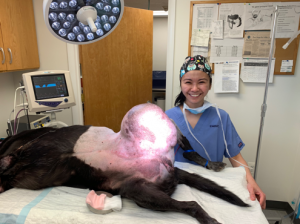
I Found A Lump On My Pet. Is It Dangerous?
Clients often find lumps or bumps on their pets’ bodies. In the veterinary profession we call these abnormalities “growths” or “masses.” Sometimes these growths — which protrude from, or are palpable within, the deeper tissues of the skin — are cancerous, or malignant, but often they are benign. Our job at EMRVC is to allay the client’s concerns, and identify exactly what is on their animal’s body.
What Kinds of Animals Develop Lumps
Lumps are quite common in dogs, but not so much in cats, and occur increasingly with age. What we see in cats are sarcomas, abscesses, and mammary growths. As with dogs, the best chance for a cure is when these lumps and bumps are small.
How Veterinarians Test Lumps
When we encounter a suspicious lump, we perform what is called cytology to figure out what kind of cells it contains. We accomplish this by simply doing a needle aspirate of the lump or bump by using a small needle and syringe, then examine the tiny amount of fluid or tissue that is obtained under the microscope.
Often this diagnosis can be made within the time of the appointment! If it appears malignant and of small size we can schedule surgical removal with the goal of a cure.
The types of lumps and bumps commonly seen in dogs
Sebaceous warts or cysts – These occur anywhere including the face, torso and limbs; Sometimes we use cryofreezing to treat. Surgery is only needed if they are a nuisance to the pet, or are infected or ulcerated.
Fatty tumors or “lipomas” (extreme example in photo below) – These occur most commonly on the torso, especially in the armpits and sternum; A simple aspirate reveals fat on the glass slide; No treatment or surgery is necessary unless it becomes so big as to impact your dog’s mobility.

Cutaneous histiocytomas – These occur most commonly on the head of a young dog; Typically they are round, red, raised with no hair; Rarely surgery is needed and almost always they regress within 2-4 weeks.
Mast cell tumors – These occur anywhere on the body and can look like other skin masses; this is likely the most important REASON why we do an aspirate of the lump. Surgical removal when they are small is almost always curative.
Sarcomas or spindle cell tumors – These can occur anywhere on the body and legs; Usually they are very firm and not well demarcated; When they occur on the leg, amputation is often the best chance for a cure.
Lymphoma – This is a cancer of the lymph nodes; You will almost always see “bilaterally symmetric” lumps under the chin, in front of the shoulders, and behind the knees.
Inflammatory lesion or abscess – These can occur anywhere, sometimes as a result of an insect/animal bite or even a vaccine injection.
If you have questions about a lump on your pet, contact EMRVC to schedule a diagnostic visit.
— Dr. Joe Zulty, Chief Medical Director
Essex Middle River Veterinary Center provides medical and surgical care for cats and dogs at our animal hospital and veterinary clinic in Essex, Maryland, just outside of Baltimore. Our services include preventive wellness care exams, vaccines, spays/neuters, and a variety of specialized care. Our state-of-the-art veterinary offices are conveniently located near I-695 where we see pets from Towson, Honeygo, White Marsh, and other neighboring Baltimore areas.
